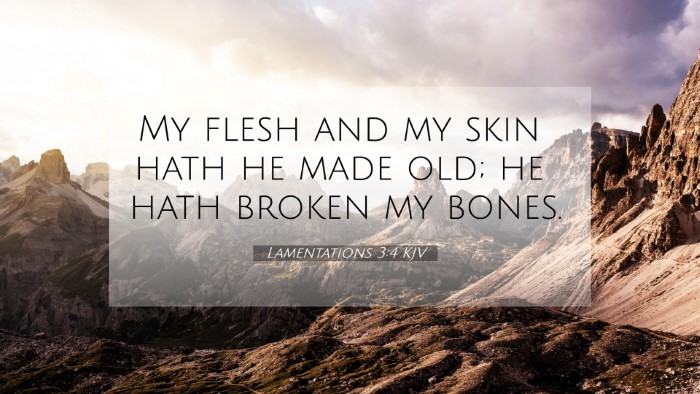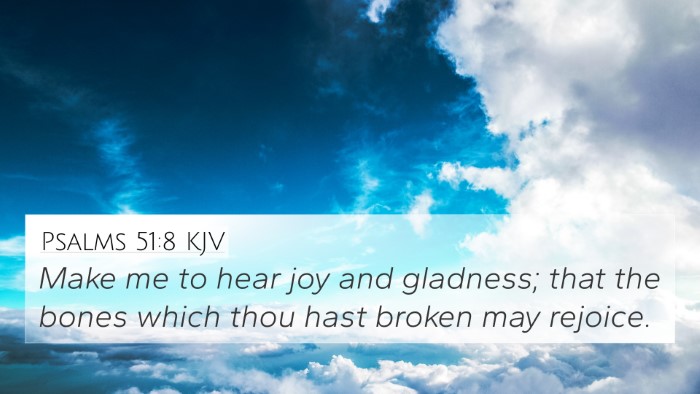Lamentations 3:4 - Summary and Interpretation
The verse Lamentations 3:4 states: “He hath led me, and brought me into darkness, but not into light.” This poignant verse illustrates the profound sense of suffering and despair experienced by the author, traditionally believed to be the prophet Jeremiah. Below, we explore the verse's meaning through the insights of renowned public domain commentators like Matthew Henry, Albert Barnes, and Adam Clarke.
Meaning and Insights
Contextual Background
To understand Lamentations 3:4, it is essential to comprehend the context of the Book of Lamentations, which was written in the aftermath of the fall of Jerusalem. The nation of Israel, facing devastation and exile, encompasses a collective grief and longing for restoration. The verse here is a reflection of deep sorrow and an acknowledgment of the darkness that envelops the people.
Matthew Henry's Commentary Insights
Matthew Henry notes that this verse captures the profound anguish felt during periods of divine chastisement. The phrase "He hath led me, and brought me into darkness" emphasizes the role of God in guiding the sufferings of individuals, suggesting that these experiences serve a higher purpose. Henry suggests that this “darkness” symbolizes trials and tribulations that test one's faith.
- God's Sovereignty: Henry emphasizes God's control over both light and darkness.
- Spiritual Lessons: Such experiences are seen as teaching moments that draw individuals closer to God.
Albert Barnes' Commentary Insights
Albert Barnes elaborates on the anguish inherent in this verse, interpreting the darkness as a metaphor for affliction and despair. He highlights the contrast between God’s guiding hand and the resultant suffering. Barnes indicates that the speaker feels led into trials, highlighting the importance of seeing God’s hand even in struggles.
- Affliction as Guidance: Barnes emphasizes that such afflictions are not without purpose.
- The Role of Faith: Even in darkness, believers are encouraged to trust in God’s ultimate plan.
Adam Clarke's Commentary Insights
Adam Clarke explains that the 'darkness' referred to can symbolize both physical and spiritual desolation. He asserts that this suffering is a result of sin and disobedience, bringing about a necessary reckoning. Clarke suggests that while the darkness may seem overwhelming, it is also a call to repentance and a path toward reconciliation with God.
- Repentance: Clarke sees darkness as a precursor to spiritual awakening.
- Promise of Restoration: He notes that understanding one's suffering is vital for hope and restoration.
Cross References and Thematic Connections
In the context of Lamentations 3:4, several Bible verses provide thematic parallels and deeper understanding. Below is a list of relevant cross references:
- Psalm 23:4: "Yea, though I walk through the valley of the shadow of death, I will fear no evil: for thou art with me." - Emphasizes God’s presence in darkness.
- Isaiah 45:7: "I form the light, and create darkness: I make peace, and create evil: I the Lord do all these things." - Discusses God’s sovereignty over darkness.
- 2 Corinthians 4:8-9: "We are troubled on every side, yet not distressed; we are perplexed, but not in despair; persecuted, but not forsaken; cast down, but not destroyed;" - Highlights resilience in adversity.
- Romans 5:3-4: "And not only so, but we glory in tribulations also: knowing that tribulation worketh patience; and patience, experience; and experience, hope:" - Teaches the value of suffering.
- Job 30:20: "I cry unto thee, and thou dost not hear: I stand up, and thou regardest me not." - Reflects a similar situation of perceived abandonment in darkness.
- Micah 7:8: "Rejoice not against me, O mine enemy: when I fall, I shall arise; when I sit in darkness, the Lord shall be a light unto me." - Promises God’s light in dark times.
- Matthew 27:45: "Now from the sixth hour there was darkness over all the land unto the ninth hour." - The darkness at Christ's crucifixion signifies profound spiritual significance.
Concluding Thoughts
The insights from Lamentations 3:4 prompt reflection on the nature of suffering, God's sovereignty, and the eventual hope for redemption. This verse serves as a reminder that even in moments of profound darkness, there can be assurance in God's presence and the lessons that suffering can bring.
In exploring the connections between Lamentations 3:4 and other scripture, the themes of suffering, hope, and the journey through darkness emerge as key theological concepts. Engaging with cross-references provides a richer understanding of how different portions of the Bible speak to one another, creating a tapestry of divine promises and human experiences.











